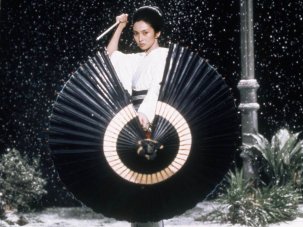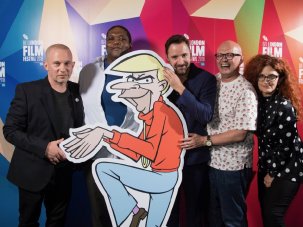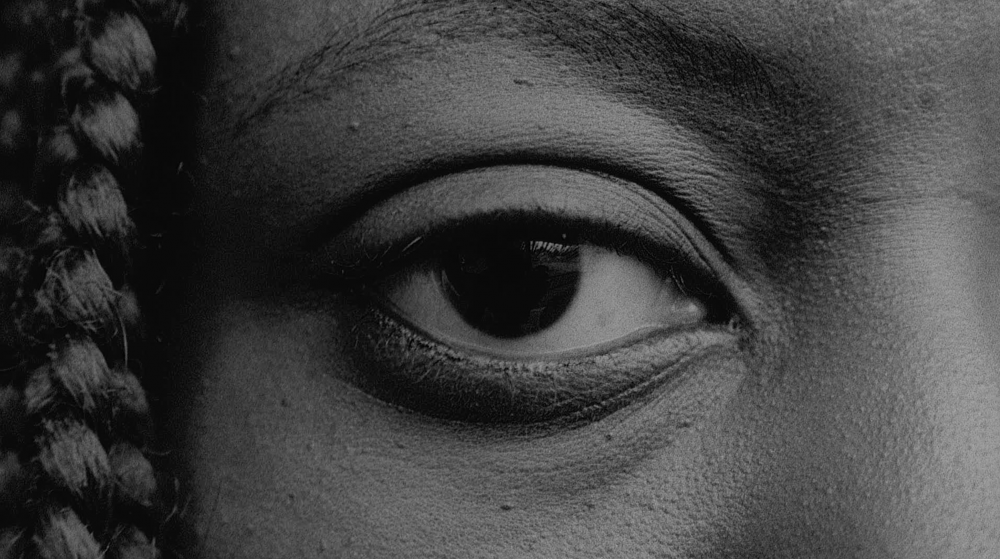
A Is for Artist, Ayo Akingbade
On 12 October 2018 the Experimenta Debate: Representation and Praxis took place at the ICA as part of the BFI London Film Festival. Artist workers’ cooperative not/nowhere invited artists working with the moving image to discuss their positions on representation in visual culture, considering the extent to which the visibility of subjects on screen correlates to those same subjects’ agency and sovereignty in praxis. And, what do these artists think of propositions that new or renewed visibility is an index of social progress?
To preface the video and audio documentation of the event, Tendai Mutambu, Experimenta Associate at the LFF, reflects on two of the works in the film programme that inspired the debate.
Morgan Quaintance’s Another Decade
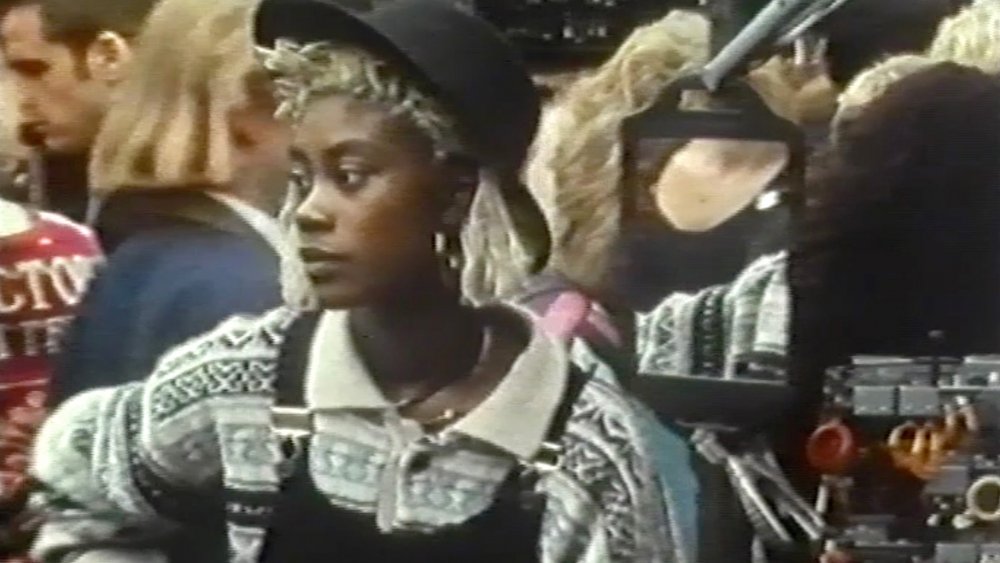
Another Decade (2018)
Morgan Quaintance’s Another Decade (2018) is a searing riposte to any triumphalist account of the 1990s. In its roaring montage of archival footage, recently shot 16mm film and standard definition video, it summons urban life’s chaos – its charms and its conflicts – into a dizzying anthology.
If the 90s have been cast as solemnly anodyne, this exhumation claws at the shallow grave of our collective amnesia. New Labour, Britpop and ‘Cool Britannia’ somehow became the threadbare emblems of a decade bookended by Thatcher’s departure on one end and the calamities of 9/11 on the other. Meanwhile, in the shadow of outsize multinationals, the body politic lay besieged by the usual threats: institutional racism, police brutality, gendered violence, heterosexism and a seething, age-old contempt for the working poor.
“To polemicise is our right, of course. But to polemicise can equally be a luxury.” These are the somewhat conflicting words of a young Olu Oguibe, uttered around three and a half minutes into Another Decade. His initial concession strains under the weight of the latter assertion; the language of rights and luxuries – or entitlements and privileges, if you will – has always been a difficult one to parse. But Quaintance seems less concerned with such niceties, running roughshod over pesky little digressions that might distract us from the simple fact that too little has changed, institutionally, over the last few decades. He contrasts the statements of theorists and cultural producers – still salient over two decades later – with the words of those at the margins whose lives are not so much touched as they are strangled by the whims of the ruling class.
In 1994, on the occasion of Oguibe’s pronouncement, he was one of several notable contributors to a panel at Tate Britain, brought together under the auspices of a recently established Iniva (Institute of International Visual Arts). (The symposium’s title, A New Internationalism, bore more than a slight hint of the globalising NGO-speak characteristic of the era’s ascendant managerial class.)
But one question seems to have persisted more than others: can we extricate ourselves from the interminable cycle of art-world panels, talks, symposia and their preening intellectual pageantries long enough to effect material change? Another Decade is, in many ways, a work that tussles with our political inertia and the twisted irony of the words we use to mask it. To polemicise may not be a luxury after all; it may just be a right afforded to too few of us.
Bouchra Khalili’s Twenty-Two Hours
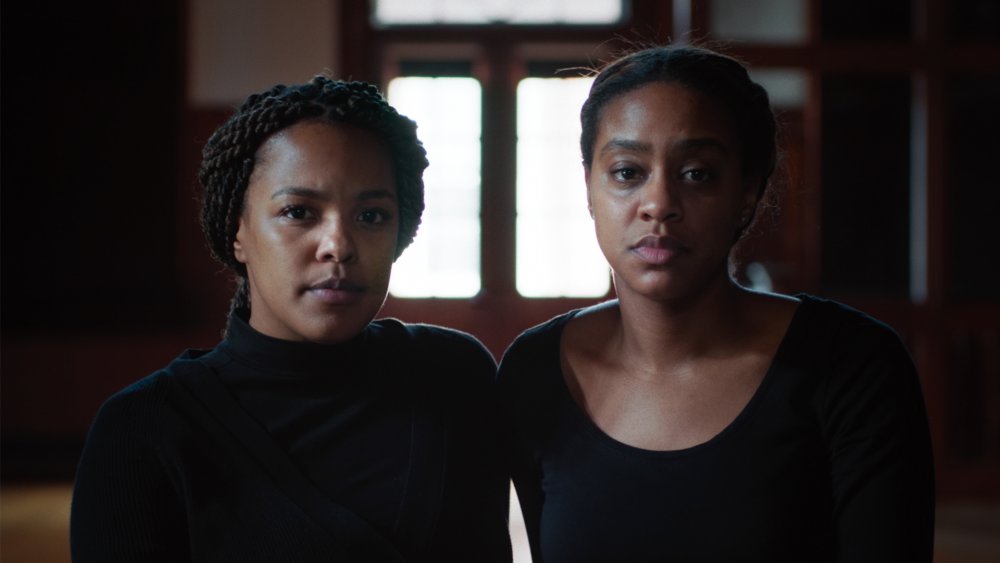
Twenty-Two Hours (2018)
“How does one lend their voice to a struggle that they have not lived through – or one they may never embody?” The question is one of perennial concern among those who dare to wade in the turgid waters of activism. Bouchra Khalili’s Twenty-Two Hours is, by some measure, a work about this very issue, drawing on the novelist, poet and playwright Jean Genet (1910-86) as an object lesson.
In March 1970, Genet made a clandestine visit to the United States at the invitation of the Black Panther Party. For two months he travelled and spoke from City College New York to MIT, Columbia to UCLA. His mission: to help the Panthers mobilise white progressives against the imprisonment of the party’s co-founder, Bobby Seale, who had been arrested on charges of murder and kidnap in 1969, for which he faced electrocution if convicted. (Seale would later be acquitted of the charges.)
“They are no longer simply comrades in combat,” Genet said of the Panthers. “They have become friends.” The 59-year-old gay Frenchman had, by the time of his trip, become an unlikely hero to that class of black revolutionaries. As Angela Davis (who was, at the time of Genet’s trip, tasked with translating his speeches from French to English) noted: “[T]here were many of us who already considered him an ally.”
His play The Blacks: A Clown Show (Les Nègres, clownerie) (1958) – an incendiary metadrama on race in the United States with an all-black cast, some of whom donned white make-up to portray the play’s white characters – sent a jolt through the nation’s nervous system; it would go on to be the longest-running off-Broadway non-musical in 1960s New York.
Khalili’s latest work is a 40-minute meditation on the figure of ‘the ally’, or, to use the film’s juridical parlance, ‘the witness’. Its narrators – Quiana and Vanessa, two young African-American women, and Doug Miranda, a former Panther – assume the roles of witnesses who animate and bear testament to an archive of black radicalism, in all its incompleteness. And much like the artist’s own perspective, theirs are voices placed among many fragments of images, sounds and stories – all animated by the ghosts of history.
During the winter of Genet’s American trip, as if by some wild twist of fate, filmmakers Jean-Luc Godard and Jean-Pierre Gorin toured the US as the Dziga Vertov Group. The pair appear in Twenty-Two Hours, endorsing the call to “Free Bobby Seale” with a characteristically French forthrightness that cut through the verbiage of their interviewer – a Yale student – who must have felt a little more than rebuked.
Yes, these auteurs-turned-activists had crossed the Atlantic for a university lecture tour and to raise money for their film on Palestinian resistance – a project they never completed – but when the call came to stand in solidarity with the Panthers, they responded.
Nearly two decades later, in Prisoner of Love (1986), a book published posthumously, Genet would synthesise these coinciding revolutionary impulses – from black liberation to the Palestinian resistance – that had infected his psyche. And later in 1970 Genet would spend time in Jordan, living among the Palestinian refugees.
Such was Genet’s sensibility: attempting to assimilate the root causes of oppression through proximity to those at its sharpest end. The once-petty criminal, prisoner and prostitute – discharged from the military for ‘indecent’ (read: homosexual) acts – knew something of what it meant to struggle but, more importantly, he learned to connect the cause of his pain to that of others.
What Genet sought to cultivate, over his many years and lives, was a form of empathy without appropriation, a sympathy without arrogation.
The Experimenta Debate: Representation and Praxis
Inspired by Tendai Mutambu’s ’Twenty-Two Hours’ Experimenta 2018 programme, not/nowhere invited artists working with the moving image to discuss their positions on representation in visual culture. Featuring Rabz Lansiquot and Experimenta artists Emma Wolukau-Wanambwa, Ayo Akingbade and Morgan Quaintance. Organised by Taylor Le Melle for not/nowhere.
Experimenta Debate Part 1: Taylor Le Melle & Rabz Lansiquot
Experimenta Debate Part 2: Emma Wolukau-Wanambwa
Experimenta Debate Part 3: Morgan Quaintance & Ayo Akingbade
Listen to the Experimenta Debate Part 4: Group Discussion with Audience
Experimenta Debate - event handout 133.55 KB
Experimenta is the artists’ moving image strand of the BFI London Film Festival, in association with Lux, programmed by Benjamin Cook, Helen De Witt, Kate Taylor, William Fowler, and Experimenta Associates Qila Gill and Tendai Mutambu, and project managed by Elizabeth Frey. The Experimenta programme is supported using public funding by Arts Council England. See the full programme line-up, documentation for Anatomy of a Film Production: Doozy, and explore a contextual blog on the 2018 programme.



